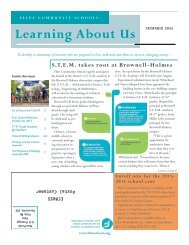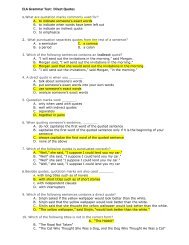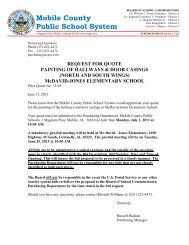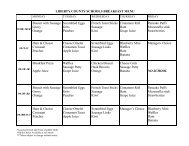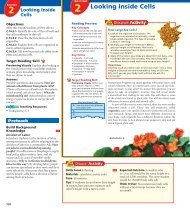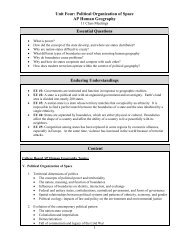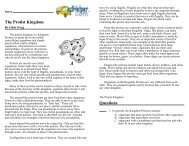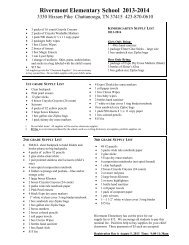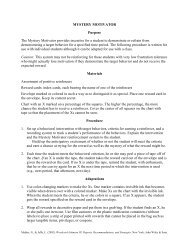Death by Landscape by Margaret Atwood - Baby's First Year
Death by Landscape by Margaret Atwood - Baby's First Year
Death by Landscape by Margaret Atwood - Baby's First Year
You also want an ePaper? Increase the reach of your titles
YUMPU automatically turns print PDFs into web optimized ePapers that Google loves.
4 of 8 <strong>Death</strong> <strong>by</strong> <strong>Landscape</strong> (Cont.)<br />
Every canoe trip that went out of<br />
camp was given a special send-off <strong>by</strong><br />
Cappie and the section leader and<br />
counselors, with the whole section in<br />
attendance. Cappie painted three<br />
streaks of red across each of her<br />
cheeks with a lipstick. They looked<br />
like three-fingered claw marks. She<br />
put a blue circle on her forehead with<br />
fountain-pen ink, tied a twisted<br />
bandanna around her head and stuck<br />
a row of frazzle-ended feathers<br />
around it, and wrapped herself in a<br />
red and black Hudson's Bay blanket.<br />
The counselors, also in blankets but<br />
with only two streaks of red, beat on<br />
tom-toms made of round wooden<br />
cheeseboxes with leather stretched<br />
over the top and nailed in place. Cappie<br />
was Chief Cappeosora. They all<br />
had to say "How!" when she walked<br />
into the circle and stood there with<br />
one hand raised.<br />
Looking back on this, Lois finds it disquieting.<br />
She knows too much about<br />
Indians. She knows, for instance, that<br />
they should not even be called Indians,<br />
and that they have enough worries<br />
without other people taking their<br />
names and dressing up as them. It<br />
has all been a form of stealing.<br />
But she remembers too that she was<br />
once ignorant of this. Once she loved<br />
the campfire, the flickering of light on<br />
the ring of faces, the sound of the<br />
fake tom-toms, heavy and fast like a<br />
scared heartbeat; she loved Cappie in<br />
a red blanket and feathers, solemn, as<br />
a Chief should be, raising her hand<br />
and saying, "Greetings, my Ravens."<br />
It was not funny, it was not making<br />
fun. She wanted to be an Indian. She<br />
wanted to be adventurous and pure,<br />
and aboriginal.<br />
"YOU go on big water," says Cappie.<br />
This is her idea – all their ideas – of<br />
how Indians talk. "You go where no<br />
man has ever trod. You go many<br />
moons." This is not true. They are<br />
only going for a week, not many<br />
moons. The canoe route is clearly<br />
marked, they have gone over it on a<br />
map, and there are prepared campsites<br />
with names that are used year<br />
after year. But when Cappie says this<br />
– and despite the way Lucy rolls up<br />
her eyes – Lois can feel the water<br />
stretching out, with the shores twisting<br />
away on either side, immense and<br />
a little frightening.<br />
"You bring back much wampum," says<br />
Cappie: "Do good in war, my braves,<br />
and capture many scalps." This is another<br />
of her pretenses: that they are<br />
boys, and bloodthirsty. But such a<br />
game cannot be played <strong>by</strong> substituting<br />
the word squaw. It would not<br />
work at all.<br />
Each of them has to stand up and<br />
step forward and have a red line<br />
drawn across her cheeks <strong>by</strong> Cappie.<br />
She tells them they must follow in the<br />
paths of their ancestors (who most<br />
certainly, thinks Lois, looking out the<br />
window of her apartment and remembering<br />
the family stash of<br />
daguerreotypes and sepia-colored<br />
portraits on her mother's dressing<br />
table – the stiff-shirted, black-coated,<br />
grim-faced men and the beflounced<br />
women with their severe hair and<br />
their corsetted respectability – would<br />
never have considered heading off<br />
onto an open lake in a canoe, just for<br />
fun).<br />
At the end of the ceremony they all<br />
stood and held hands around the<br />
circle and sang taps. This did not<br />
sound very Indian, thinks Lois. It<br />
sounded like a bugle call at a military<br />
post, in a movie. But Cappie was<br />
never one to be much concerned with<br />
consistency, or with archaeology.<br />
AFTER breakfast the next morning<br />
they set out from the main dock, in<br />
four canoes, three in each. The lipstick<br />
stripes have not come off completely<br />
and still show faintly pink, like<br />
healing burns. They wear their white<br />
denim sailing hats, because of the<br />
sun, and thin-striped T-shirts, and<br />
pale baggy shorts with the cuffs rolled<br />
up. The middle one kneels, propping<br />
her rear end against the rolled sleeping<br />
bags. The counselors going with<br />
them are Pat and Kip. Kip is no-nonsense;<br />
Pat is easier to wheedle or<br />
fool.<br />
There are white puffy clouds and a<br />
small breeze. Glints come from the<br />
little waves. Lois is in the bow of Kip's<br />
canoe. She still can't do a j-stroke<br />
very well, and she will have to be in<br />
the bow or the middle for the whole<br />
trip. Lucy is behind her; her own jstroke<br />
is even worse. She splashes<br />
Lois with her paddle, quite a big<br />
splash.<br />
"I'll get you back," says Lois.<br />
"There was a stable fly on your<br />
shoulder," Lucy says.<br />
Lois turns to look at her, to see if<br />
she's grinning. They're in the habit of<br />
splashing each other. Back there, the<br />
camp has vanished behind the first<br />
long point of rock and rough trees.<br />
Lois feels as if an invisible rope has<br />
broken. They're floating free, on their<br />
own, cut loose. Beneath the canoe the<br />
lake goes down, deeper and colder<br />
than it was a minute before.<br />
"No horsing around in the canoe,"<br />
says Kip. She's rolled her T-shirt<br />
sleeves up to the shoulder; her arms<br />
are brown and sinewy, her jaw determined,<br />
her stroke perfect. She<br />
looks as if she knows exactly what<br />
she is doing.<br />
The four canoes keep close together.<br />
They sing, raucously and with defiance;<br />
they sing "The Quarter Master's<br />
Store" and "Clementine" and "Alouette."<br />
It is more like bellowing than<br />
singing.<br />
After that the wind grows stronger,<br />
blowing slantwise against the bows,<br />
and they have to put all their energy<br />
into shoving themselves through the<br />
water.



